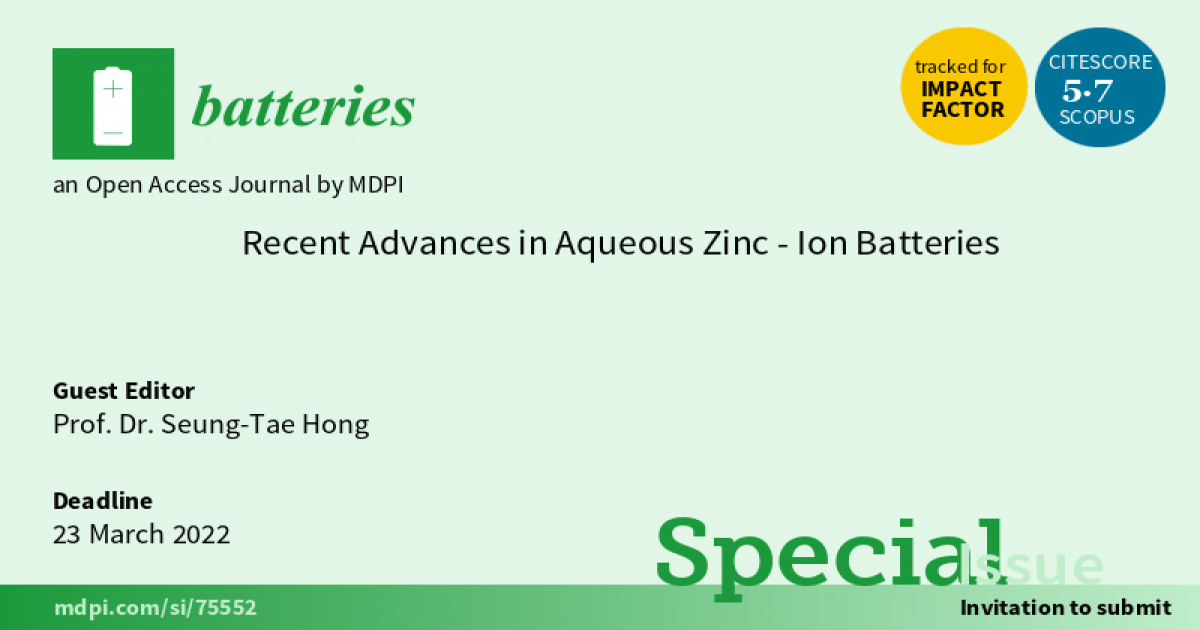Recent Advances in Aqueous Zinc-Ion Batteries
A special issue of Batteries (ISSN 2313-0105).
Deadline for manuscript submissions: closed (23 March 2022) | Viewed by 3746

Special Issue Editor
Interests: all-solid-state batteries (Li, Na); Mg-ion batteries; Ca-ion batteries; Li-ion batteries; X-ray crystallography
Special Issues, Collections and Topics in MDPI journals
Special Issue Information
Dear Colleagues,
In recent years, rechargeable aqueous zinc-ion batteries (RAZIBs) have received increased attention as one of the divalent-ion-based batteries because of the numerous advantages of using zinc, such as its safety, natural abundance, cost-effectiveness, environmental friendliness, high volumetric capacity, and ease of handling in air. Research on aqueous zinc-ion batteries will continue to grow and is gaining importance for other applications, e.g., large-scale energy storage systems.
Despite the recent advances in RAZIB technology, discoveries and further improvements are still required in the fields of high-energy cathode materials, zinc-based anodes, electrolytes, cell design, various-scale tests, battery management systems, and safety. Therefore, this Special Issue will focus on future directions to pursue for the development of RAZIBs.
Potential topics include but are not limited to:
- Cathode materials;
- Anode materials;
- Electrolytes;
- New principles based on zinc chemistry;
- Electrical, thermal, and electrochemical testing and modeling;
- High-performance and efficiency technologies;
- Lifetime testing, aging mechanisms, and lifetime prediction;
- Safety and environmental issues;
- Battery cell and pack design;
- Battery management systems and methods.
Prof. Dr. Seung-Tae Hong
Guest Editor
Manuscript Submission Information
Manuscripts should be submitted online at www.mdpi.com by registering and logging in to this website. Once you are registered, click here to go to the submission form. Manuscripts can be submitted until the deadline. All submissions that pass pre-check are peer-reviewed. Accepted papers will be published continuously in the journal (as soon as accepted) and will be listed together on the special issue website. Research articles, review articles as well as short communications are invited. For planned papers, a title and short abstract (about 100 words) can be sent to the Editorial Office for announcement on this website.
Submitted manuscripts should not have been published previously, nor be under consideration for publication elsewhere (except conference proceedings papers). All manuscripts are thoroughly refereed through a single-blind peer-review process. A guide for authors and other relevant information for submission of manuscripts is available on the Instructions for Authors page. Batteries is an international peer-reviewed open access monthly journal published by MDPI.
Please visit the Instructions for Authors page before submitting a manuscript. The Article Processing Charge (APC) for publication in this open access journal is 2700 CHF (Swiss Francs). Submitted papers should be well formatted and use good English. Authors may use MDPI's English editing service prior to publication or during author revisions.
Keywords
- zinc-ion batteries
- cathode materials
- anode materials
- electrode design
- cell design
- energy storage and conversion
- applications
- safety
Benefits of Publishing in a Special Issue
- Ease of navigation: Grouping papers by topic helps scholars navigate broad scope journals more efficiently.
- Greater discoverability: Special Issues support the reach and impact of scientific research. Articles in Special Issues are more discoverable and cited more frequently.
- Expansion of research network: Special Issues facilitate connections among authors, fostering scientific collaborations.
- External promotion: Articles in Special Issues are often promoted through the journal's social media, increasing their visibility.
- e-Book format: Special Issues with more than 10 articles can be published as dedicated e-books, ensuring wide and rapid dissemination.
Further information on MDPI's Special Issue polices can be found here.





